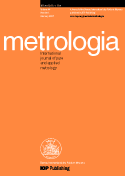
METROLOGIA
Scope & Guideline
Driving Progress in Measurement Science Since 1965
Introduction
Aims and Scopes
- Measurement Standards and Calibration:
The journal emphasizes the development of new measurement standards and methods for various physical quantities, ensuring traceability and accuracy in measurements across disciplines. - Advanced Measurement Techniques:
Research on cutting-edge techniques for measurement, including interferometry, spectrometry, and quantum-based methods, is a core focus, contributing to the precision of measurements in both laboratory and field settings. - Uncertainty Quantification:
A significant aspect of the journal's scope is the evaluation and reduction of measurement uncertainty, providing methodologies and case studies that enhance the reliability of measurement results. - Inter-laboratory Comparisons:
The journal highlights studies on inter-laboratory comparisons to establish consensus on measurement results, which is critical for maintaining standards in metrology and ensuring comparability across different laboratories. - Emerging Technologies in Metrology:
Research that explores the application of new technologies, including machine learning and nanotechnology, in improving measurement processes and accuracy is increasingly featured. - Application of Metrology in Industrial and Scientific Contexts:
The journal publishes studies that apply metrology to various industries, including environmental monitoring, healthcare, and manufacturing, showcasing the practical implications of measurement science.
Trending and Emerging
- Quantum Metrology:
There is a growing interest in quantum metrology, which leverages quantum phenomena to enhance measurement precision. Research in this area is expanding rapidly, driven by advancements in quantum technologies and their applications. - Machine Learning and Data Science in Metrology:
The integration of machine learning and data science techniques into metrology is on the rise, with studies focusing on how these technologies can improve measurement processes, data analysis, and uncertainty evaluation. - Environmental and Sustainability Measurements:
Research addressing environmental measurement standards and sustainability practices is increasingly prominent, reflecting global concerns about climate change and the need for accurate environmental monitoring. - Advanced Sensor Technologies:
There is a trend towards the development and characterization of advanced sensors, particularly those that operate in extreme conditions or provide real-time data, enhancing measurement capabilities in various fields. - Integration of IoT in Metrology:
The application of Internet of Things (IoT) technologies in metrology is emerging, with studies exploring how interconnected devices can facilitate real-time monitoring and data collection in measurement systems.
Declining or Waning
- Traditional Measurement Methods:
There has been a noticeable decrease in publications focused on traditional measurement methods that lack the sophistication of modern techniques, as researchers increasingly prioritize advanced methodologies. - Basic Theoretical Studies:
Papers focusing solely on basic theoretical aspects of metrology without practical applications are becoming less common, as there is a stronger emphasis on applied research that demonstrates tangible benefits. - Single-Discipline Studies:
Research that is confined to a single discipline of metrology is waning, with a growing trend towards interdisciplinary approaches that integrate concepts from multiple fields, such as physics, engineering, and data science. - Historical Perspectives in Metrology:
While historical studies are valuable, there has been a decrease in the publication of research that primarily focuses on historical perspectives of measurement practices, as the journal shifts towards contemporary challenges and innovations.
Similar Journals
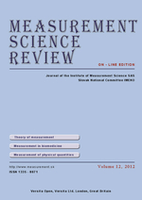
Measurement Science Review
Advancing the Frontiers of Measurement ScienceMeasurement Science Review is a distinguished open-access journal published by SCIENDO, dedicated to advancing the field of measurement science across various disciplines, including Biomedical Engineering, Control and Systems Engineering, and Instrumentation. Since its inception in 2008, it has actively contributed to the dissemination of innovative research and practices relevant to these fields, currently holding a notable Q3 ranking in its category as per the 2023 metrics. With an emphasis on robust scientific inquiry and practical applications, Measurement Science Review is positioned as an essential resource for researchers, professionals, and students seeking to enhance their understanding and expertise in measurement technologies. The journal provides an accessible platform for interdisciplinary dialogue and collaboration, making it a vital component of the academic landscape in Slovakia and beyond. Its publication track extends to 2024, ensuring timely access to cutting-edge research findings for a global audience.
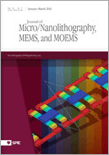
Journal of Micro-Nanopatterning Materials and Metrology-JM3
Pioneering Research for a Nano-Enhanced FutureJournal of Micro-Nanopatterning Materials and Metrology (JM3), published by SPIE - The International Society for Optics and Photonics, is a premier forum for advancing knowledge within the realms of micro-nanopatterning and metrology. With an ISSN of 1932-5150 and an E-ISSN of 2708-8340, JM3 has established itself as a valuable resource since its inception in 2007, converging critical research toward 2024. The journal has recently achieved recognition in various scientific domains, holding a Q3 category in fields such as Atomic and Molecular Physics, Condensed Matter Physics, and Nanoscience, while also being placed in Q2 for Mechanical Engineering in 2023. Given its multifaceted focus, JM3 engages a wide audience, including engineers, physicists, and materials scientists, facilitating a dialogue that bridges theoretical and practical innovations. Open access options enable broader dissemination of research findings, enhancing visibility and impact. By continually striving to publish cutting-edge research and methodologies, JM3 plays a crucial role in shaping the future of material sciences and engineering practices.
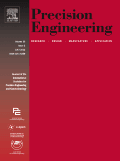
PRECISION ENGINEERING-JOURNAL OF THE INTERNATIONAL SOCIETIES FOR PRECISION ENGINEERING AND NANOTECHNOLOGY
Transforming Ideas: Your Resource for Precision Engineering BreakthroughsPRECISION ENGINEERING - JOURNAL OF THE INTERNATIONAL SOCIETIES FOR PRECISION ENGINEERING AND NANOTECHNOLOGY, published by Elsevier Science Inc, stands at the forefront of advancements in engineering and nanotechnology since its inception in 1979. With a commendable impact factor and a ranking of Q1 in Engineering and Q2 in Nanoscience and Nanotechnology, this journal offers a premier platform for disseminating cutting-edge research that merges precision engineering with nanotechnology innovations. Its Scopus ranking positions it within the top 13% of journals in general engineering, making it an essential resource for academics and industry professionals alike. Although it does not currently offer open access, the journal promotes high-quality, peer-reviewed research that is crucial for ongoing developments in the field. Researchers, professionals, and students dedicated to precision engineering and related disciplines will find this journal to be an invaluable repository of knowledge and ideas.
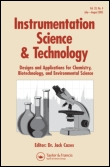
INSTRUMENTATION SCIENCE & TECHNOLOGY
Exploring the Intersection of Science and Technology in InstrumentationInstrumentation Science & Technology, published by Taylor & Francis Inc, is a leading journal in the fields of Chemical Engineering, Environmental Science, and Instrumentation. With an ISSN of 1073-9149 and an E-ISSN of 1525-6030, this established publication spans a rich history from 1968 to 1972, 1974 to 1977, 1979 to 1982, 1984 to 1990, and continuing through to 2024. Positioned in the Q3 category of its subject areas, it ranks competitively within the Scopus framework, notably achieving rank #103/233 in Environmental Science and #138/273 in Chemical Engineering. Aimed at researchers, professionals, and students, this journal serves as a crucial platform for advancing knowledge in instrumentation technologies and their applications across various disciplines. Although not an open-access journal, it provides valuable insights and peer-reviewed articles that are essential for staying at the forefront of instrumentation science.
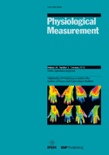
PHYSIOLOGICAL MEASUREMENT
Exploring the Intersection of Physiology and TechnologyPhysiological Measurement, published by IOP Publishing Ltd, is a leading journal dedicated to the field of physiological signal analysis and its applications across various domains including Biomedical Engineering, Biophysics, and Physiology. With its ISSN 0967-3334 and E-ISSN 1361-6579, the journal has established itself as a pivotal resource for researchers and professionals seeking to advance their understanding of physiological systems. The journal spans from 1993 to 2024 and boasts respectable rankings, holding a Q2 ranking in Biophysics and Q3 rankings in several other categories as of 2023. Despite lacking an Open Access format, it remains instrumental in disseminating significant research findings aimed at improving medical and engineering practices. Located in the United Kingdom, at TEMPLE CIRCUS, TEMPLE WAY, BRISTOL BS1 6BE, Physiological Measurement serves as a bridge for innovative research that informs both theoretical and practical aspects of physiology, encouraging interdisciplinary collaboration among scholars and specialists in the field.

Photonics Letters of Poland
Illuminating Innovations in PhotonicsPhotonics Letters of Poland is a prominent journal dedicated to the field of photonics, published by the Photonics Society of Poland. With an ISSN of 2080-2242, the journal aims to foster knowledge and innovation within electronic, optical, and magnetic materials. Although it currently holds a Q4 classification in its category and is ranked in the 21st percentile, it serves as an essential platform for researchers and practitioners to share their findings and advancements. The journal covers a range of topics from foundational research to applied science, highlighting advancements in photonics technologies and their applications. Operating from Warsaw University of Technology, the journal promotes open access to knowledge while ensuring rigorous peer review standards. With its coverage spanning from 2009 to 2024, Photonics Letters of Poland represents a vital contribution to ongoing research within the field, making it indispensable for students, professionals, and academics looking to stay attuned to emerging trends and developments in photonics.
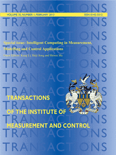
TRANSACTIONS OF THE INSTITUTE OF MEASUREMENT AND CONTROL
Uniting Expertise in the Dynamic Field of Measurement ScienceTRANSACTIONS OF THE INSTITUTE OF MEASUREMENT AND CONTROL, published by SAGE Publications Ltd, is a prestigious journal that has been at the forefront of research in measurement and control since its inception in 1979. With its ISSN 0142-3312 and E-ISSN 1477-0369, this UK-based journal is indexed in reputable databases, showcasing its impact in the field, highlighted by a notable Q2 ranking in Instrumentation for 2023. The journal serves as a vital platform for scholars and practitioners alike, publishing high-quality, peer-reviewed articles that span a range of topics related to measurement technology and control systems. With an increasing focus on interdisciplinary approaches, TRANSACTIONS OF THE INSTITUTE OF MEASUREMENT AND CONTROL strives to advance the understanding and application of innovative measurement and control methodologies, making it an essential resource for academics, industry professionals, and students aiming to enhance their knowledge and expertise in this dynamic field. Although it operates under a traditional subscription model, the journal's commitment to disseminating cutting-edge research remains unwavering, inviting contributions that push the boundaries of instrumentation and control science.

Journal of Measurements in Engineering
Advancing Precision in Engineering MeasurementsJournal of Measurements in Engineering is a pioneering open access journal dedicated to the crucial intersection of engineering and measurement technologies, published by JVE INT LTD in Lithuania. Since its transition to open access in 2018, the journal has significantly contributed to the field by providing a platform for disseminating innovative research findings and advances. With a focus on instrumentation, materials science, and mechanical engineering, it has established itself as a valuable resource for researchers, professionals, and students alike, offering insights that bridge theoretical concepts with practical applications. While currently holding a Q4 ranking in Instrumentation and Q3 ranks in both Materials Science (miscellaneous) and Mechanical Engineering, the journal encourages submissions that challenge existing paradigms and extend the boundaries of conventional measurements. As part of its commitment to fostering open scholarly communication, the journal accepts contributions reflecting a wide range of measurement methodologies and engineering applications up to the year 2024. By engaging with a global audience of practitioners and academics, the Journal of Measurements in Engineering underscores the vitality of precise measurement techniques in advancing engineering disciplines.

International Journal of Precision Engineering and Manufacturing
Innovative Insights: Shaping the Future of Manufacturing ExcellenceInternational Journal of Precision Engineering and Manufacturing, published by the Korean Society of Precision Engineering, is a key academic platform dedicated to the advancement of research in the fields of precision engineering and manufacturing. With an ISSN of 2234-7593 and an E-ISSN of 2005-4602, this esteemed journal caters to a diverse readership, including researchers, industry professionals, and students, who are committed to exploring innovative solutions in Electrical and Electronic Engineering, Industrial and Manufacturing Engineering, and Mechanical Engineering. Operating from South Korea, the journal has attained a commendable Q2 ranking in several engineering categories as of 2023, reflecting its influence and relevance in the academic community. Though it is not an open access journal, the International Journal of Precision Engineering and Manufacturing provides vital insights and updates in precision technology, bridging the gap between theory and practice. Researchers are encouraged to contribute to this evolving field and engage with high-quality studies that drive progress and innovation.
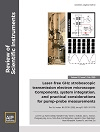
REVIEW OF SCIENTIFIC INSTRUMENTS
Fostering Excellence in Scientific Research and DevelopmentWelcome to the Review of Scientific Instruments, an esteemed journal published by AIP Publishing that has been a cornerstone in the field of scientific instrumentation since its inception in 1930. With an ISSN of 0034-6748 and E-ISSN of 1089-7623, this journal serves as a vital platform for the dissemination of innovative research and advancements in both Instrumentation and Medicine, categorized in Q3 quartiles in 2023. The journal has proudly maintained its relevance, forecasting continued publication through 2024, while providing critical insights that influence contemporary practices in various scientific domains. The impact factor reflects its contribution to the academic community, making it an invaluable resource for researchers and professionals seeking to stay at the forefront of scientific progress. Although Access is not open, the rigorous peer-review process ensures that published works are of the highest quality, making the Review of Scientific Instruments a must-read for anyone involved in the intricate world of experimental science and technological innovations.